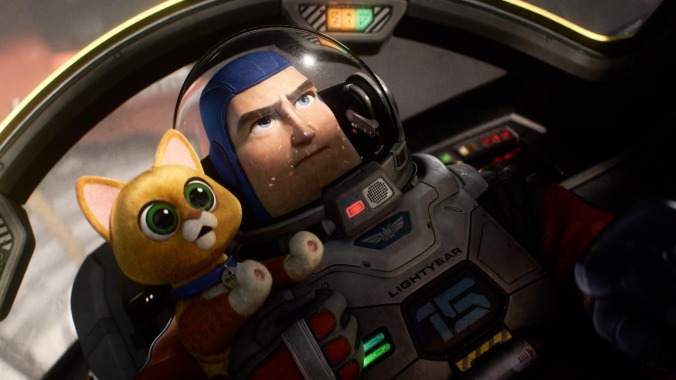Lightyear puts a finite dimension on a space toy's story
Pixar's handsomely made yet inconsequential Toy Story spin-off lacks the lean accessibility of the originals

A Toy Story origin story about kiddo Andy’s beloved space ranger, Lightyear mystified this critic when it was officially announced a few years ago. The beginnings of a talking toy who thinks he’s real? What is the premise going to be; an existential, animated, making-of mockumentary set on a factory floor, with aisles of Buzz Lightyear pieces waiting to be assembled and boxed? Turns out, this Angus MacLane-directed spin-off (from a busy screenplay by MacLane and Jason Headley) has a more straightforward explanation. As revealed in an early title card, this is apparently the movie that made 6-year-old Andy fall in love with Buzz Lightyear in 1995.
Fine, except very few moments throughout Lightyear’s drawn-out running time (the film feels longer than its actual 100 minutes) plausibly validate a small child’s instant affection for the titular hero. Or more accurately, his affection only for the titular hero. This free-standing and ambitious space adventure is packed to the gills with vibrant characters and creepy villains, most of which are sadly more interesting than Buzz himself—a cute kitty, a brave team of space misfits and a mean-spirited alternate Buzz among them—but Lightyear both struggles to justify the proposition it suggests in its opening and feels like an irrelevant oddity within the beloved Pixar series it claims to expand upon.
Why not just make a unique space film without the Toy Story connection, you might rightfully ask Pixar. The wretched marketing phrase “existing IP” is the answer you’re looking for there, and it seems to be an indispensable concept to narrow-minded studios in a theatrical release climate unfriendly to original stories not based on proven moneymakers. After all, Soul, Luca, and Turning Red—three of Pixar’s most recent original, and far superior pictures—were all sent straight to Disney+ without a theatrical release (admittedly, due to pandemic-related reasons at first). In that regard, Lightyear might possess the laser-focused pull to make Toy Story fans flock to the theaters, despite lacking the franchise’s lean and thoroughly accessible creative essence at its core.
There is nevertheless some fun to be had with this handsomely outfitted space adventure that hits some sweet spots through its creators’ evident love of sci-fi, with frequent nods to the likes of Star Wars, Alien, 2001: A Space Odyssey, and even Gravity. We meet the eminent Space Ranger Buzz Lightyear (Chris Evans, honorably taking the duties from Tim Allen) on his way back to Planet Earth after a mission beyond the atmosphere, alongside hundreds of crew members and his bestie/commander Alisha Hawthorne (Uzo Aduba). But when Buzz’s lapse in judgment lands their spacecraft (treasured for its shape that resembles a root vegetable) on a boggy planet bustling with hostile conditions, deadly bugs and snaky vines, the ranger pledges to complete the mission at all costs and return everyone safely back home.
As if the task itself wasn’t intricate enough already, Buzz’s trial-and-error flights put the hero on a different timeline than everyone else on the new planet, as they age four years each time Buzz takes another test mission. Keeping him company throughout this isolating process is his darling feline Sox (Peter Sohn), an emotional support pet assigned to Buzz while the lonely ranger watches his friends age and pass away. Meanwhile, in one lovely storyline the openly gay Alisha raises a family with her wife—even sharing a rare on-screen kiss with her—exceeding the studio’s earlier coy attempts at LGBTQ+ inclusivity in Finding Dory, Toy Story 4, and Onward.
After what already feels like a whole film, the increasingly convoluted Lightyear introduces new characters far too late into the plot: a genuinely likable ragtag team of underdogs called the Junior Zap Patrol. Joining the reluctant Buzz in his never-ending mission, the trio consists of Alisha’s space-shy granddaughter Izzy Hawthorne (Keke Palmer), Taika Waititi’s affable slacker Mo Morrison, and Dale Soules’ grumpy Darby Steel. Along with Buzz, they stand their ground against the evil robots of Captain Zurg, a character you might vaguely recall from Toy Story 2. Also in the garbled mix is mind-bending time travel more confusing than in Back To The Future Part II, an overelaborate survival mission, and a tired message better taught in Monsters University: never underestimate the hard work, determination and loyalty of your allies.
Still, there is a worthier lesson at the heart of Lightyear, one that embraces the unexpected turns that life takes when you’re “busy making other plans.” But it sadly lands like an afterthought in a movie that suffers from an excess of plot. What ultimately waters down Lightyear, an otherwise polished, gorgeous-looking entry into the Pixar oeuvre, is an absence of the excitement and disciplined storytelling spirit that made Toy Story such a pioneering hit. Even Michael Giacchino’s splendid score goes only so far towards insinuating a grand adventure that ultimately feels a little trite and bloated. Aiming for infinity and beyond, Lightyear frustratingly feels trapped on earth.